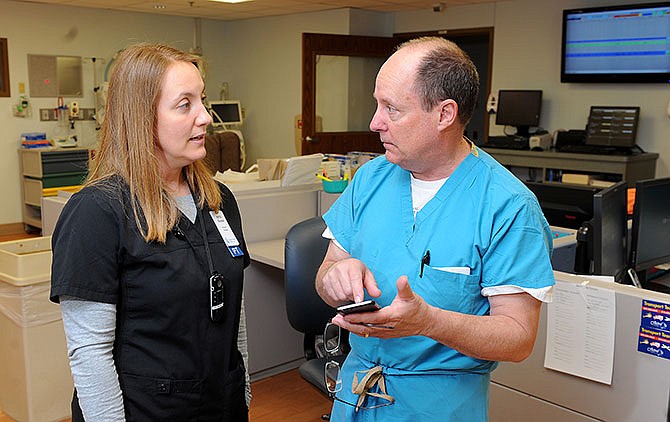COLUMBIA, Mo. (AP) - When Belle Meyers came into the world early on Feb. 24 at Boone Hospital Center, the tiny infant was in a predicament faced by most of the more than 200 premature babies born each year at Boone.
Her mother, Ashley Meyers of Sedalia, was not yet producing milk, and cow's milk-based infant formula can be especially harsh on a pre-term baby's digestive system. A solution since February 2015 has been the availability of donor human milk, provided by the OhioHealth Mothers' Milk Bank.
"I'd never really heard of that before," Ashley Meyers said. But when the medical staff explained the benefits of breast milk compared to cow's milk-based infant formula, she was easily convinced.
"I think it's a real neat program," said the 31-year-old Meyers, a medical coder at a doctor's office in Sedalia. "I think it's great that women are selfless enough" to donate their own milk. In time, she said, "hopefully I can return the favor."
Belle weighed 3 pounds, 13 ounces when she was born at 32 weeks of gestation - six weeks premature. Belle's heart had some swelling, her mom said, so avoiding further developmental complications was especially crucial.
Feeding a baby with donor milk from the onset has made a significant difference for premature babies at Boone, said Tim O'Connor, Boone Hospital Center director of neonatology. He established the hospital's neonatal intensive care unit in September 1996. Previously, infant formula was the only option for pre-term babies for the few days to a week before their mothers produce milk.
The Columbia Daily Tribune reports that the donor milk is used for all babies born weighing less than 3 pounds and for other pre-term or even full-term babies when recommended.
"I thought it would be a tougher sell" to convince parents of the benefits of donor milk, O'Connor said. "But they don't blink. We have very few people who are not enthusiastic about it."
Before her birth, medical staff predicted Belle would have digestive problems, O'Connor said.
"Obviously, the mother's own milk is the gold standard and we switch to that as soon as possible," he said. "The ability to get that donor milk is a game-changer."
The OhioHealth Mothers' Milk Bank promotes the myriad benefits of human breast milk, including infection-fighting factors, development of important hormones and overall nutrition.
Ashley Meyers said Belle, whom she named after the princess in the animated Disney feature "Beauty and the Beast," is already gaining a little weight and will hopefully top the 4-pound mark next week and go home with Ashley and her husband, Jake Meyers, to Green Ridge, about 15 miles southeast of Sedalia in Pettis County. Meyers doted on her new daughter, speaking gently as she held Belle, who was being fed her mother's milk through a nasal gastric tube.
Meyers said Belle will soon be nursing: she took her first bottle Wednesday. She's taking up to 1 ounce of her mother's milk every three hours.
Stacie Baker, clinical supervisor for 15 years at Boone Hospital, coordinates the donor milk program for Boone. Her first order of milk, which is shipped frozen in three-ounce bottles, was for five bottles. She now orders 60 at a time.
"We upped that pretty quickly," Baker said.
The neonatal intensive care unit has now gone through 530 bottles since the program started at Boone.
The 20-bed neonatal intensive care unit cares for about 12 babies each day. O'Connor said 90 percent of the NICU babies are pre-term - less than 38 weeks. Baker said roughly 10 percent of the hospital's 2,000-plus births each year are pre-term.
O'Connor said the Ohio milk bank has a stringent screening process for avoiding viruses. The milk is then pasteurized, which does not affect the nutritional value, he said.
Baker said parents must consent to using donor milk before it can be offered to infants. Hospital officials did not provide the cost associated with the donor milk program.
"It's not an inexpensive therapy," O'Connor said, quickly noting the digestive issues that infant formula can complicate for a pre-term baby. "That's not inexpensive, either." He figured the program was "cost neutral," considering those factors.
O'Connor said a group of local physicians is studying how to create a breast milk "depot" in Columbia, similar to a facility in Kansas City where women can donate their milk. Meanwhile, women who are interested in being donors can call the OhioHealth Mothers' Milk Bank at 614-566-0630 or email [email protected].

